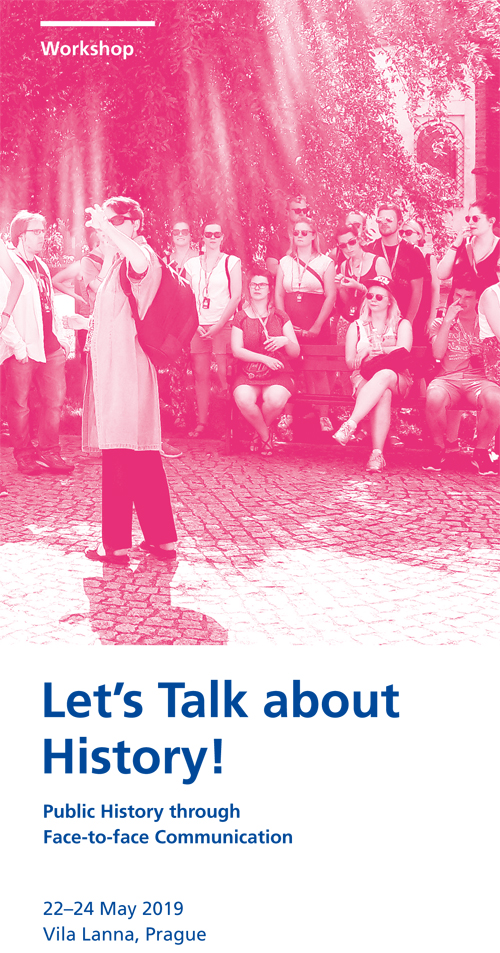Organisers: German Historical Institute Warsaw / Centre for Contemporary History, Potsdam
People talk about history – this has been the case always and everywhere. The past is the subject of oral communication in private, at school, but also in public. The motivation of the speakers ranges from the desire to recall things and enlighten others to the marketing of a service or the fulfilment of a certain range of professional tasks: there are the guides for tourists, in museums or at memorial sites, who relate local history to domestic and foreign visitors. In addition, there are witnesses of the past, who pass on their experiences during tours or at commemorative services. Furthermore, there are interpreters of living history, antiquity dealers, collectors or other amateur historians, who turn history into a subject of public discussion. Although such oral historical narratives are omnipresent, public history has so far paid astoundingly little attention to the subject. ‘Oral history’ is understood first and foremost as a method of historical research, and not as the popularisation of historical narrative in public. But non-academic history, too – and especially – is frequently also history told orally.
In the workshop, we therefore want to address various forms of oral, face-to-face communication of history. With this, we mean different non-family and non-school contexts that are explicitly initiated as opportunities to address history. Such ‘oral situations’ are temporally and locally distinct; they are, as a rule, not recorded and cannot, therefore, be repeated. The narratives are the product of situational and interactive negotiation in different spaces. They emerge in direct contact between the speakers and their audience. They are dependent on the interest of the audience, the competence, enthusiasm and mood of the narrators and, not least, on external influences, such as weather, traffic or passers-by.
The fundamental characteristic of the phenomenon – its orality – contrasts with the volume of medialised memories in written and pictorial form, which exist since the invention of the printing press and are globally available today. The fact that there are nonetheless areas of ‘re-oralisation’ of history points to the significance of everyday communication, as well as the fascination for ephemeral texts in our digitalised world. Their transience is also the reason for the topic having so far scarcely been discussed analytically in historical research and cultural studies. Unlike historical narratives in literature, museums and, increasingly, digital media, oral historical narratives that do not emerge for academic or museum purposes rarely result in analysable material. Instead, this first has to be generated by ethnographic fieldwork.
This event aims at introducing protagonists and their practices and at analysing concrete oral situations. Fundamental questions are: what type of narrative forms can be found? To what extent do the specifics of orality (redundancies, situativity, direct speech, addressing the audience, etc.) influence historical narration? Which role does the narrative time play for the time narrated? What impact do the narrative location and the direct interaction between narrators and audience have? What is the significance of intermedia correlations and external interventions? What strategies of authentication manifest themselves in the concrete situations of communication?
Programm:
Wednesday, 22 May 2019
Venue: Kampus Hybernská, Lecture Room 2D
- 18:00 Welcome
Karel Šima, Miloš Řezník, Sabine Stach - 18:15 Evening Lecture
In cooperation with CSPK Prague
Petra Tjitske Kalshoven (Manchester): The Role of Discourse in a Mimetic Practice. Performing History in European ‘lndianism’ - Get-Together / Reception
Thursday, 23 May 2019
Venue: Vila Lanna
- 9:30 Introduction
Sabine Stach, lrmgard Zündorf - 10:00 Language & History: Different Approaches to Public Oral History and History Didactics
Chair: lrmgard Zündorf
Georg Marschnig (Graz): Language Awareness and Historical Thinking. A New Challenge for History Didactics
Moritz Lautenbach-von Ostrowski (Hamburg): Approaches to Memory. Linguistic Action in Concentration Camp Memorials
Piotr Filipkowski (Warsaw): Eye-witnesses as Guides in Historical Spaces. An Oral Historian’s lmpressions
Philippe Carasco (Berlin): Talking Simply about History? A Short lnput about “Plain Language” - 12:00 Lunch
- 13:15 Talking while Walking: History in Guided Tours
Chair: Sabine Stach
Sarah Willner (Hechingen): Talking (about) Ötzi. Popular Performances of the Neolithic in Alpine Settings
Karolina Dudek / Sławomir Sikora (Warsaw): Storied City. Local Urban Histories as a Product of Collective Work of Many Actors
Alena Pfoser (Loughborough): Contested Heritage and the Work of Mnemonic lntermediation Guiding Russians through Tallinn
Magdalena Banaszkiewicz (Cracow): Personal Encounters in the lnterpretation of the Past. Reflections on Guides’ Narrations in the Chernobyl Exclusion Zone - 15:30 Coffee Break
- 16:00 Guided City Tour & Discussion
- Dinner
Friday, 24 May 2019
Venue: Vila Lanna
- 9:00 Talking about History in Museums: Exhibitions about the GDR and its End
Chair: Zdeněk Nebřenský
Philippe Carasco (Berlin): Re-oralisation of GDR History. A Comparison of Publicly and Privately Financed Museums in Berlin
Marie Müller-Zetzsche (Leipzig): How to Make a Historical Exhibition Talk. The Zeitgeschichtliches Forum Leipzig’s Permanent Exhibition
Christiane Schrübbers (Berlin): Why Didn’t Anyone Tell me That? Reactions to an Exhibition - 10:45 Coffee Break
- 11:15 Talking about History in Museums: Inclusion & Dialogue
Chair: Jakub Jareš
Patrick Helber (Berlin): Colonialism and Enslavement in a Bottle
Andy Simanowitz (Berlin): Jerusalem in Dialogue – Personal Contributions vs. Institutional Determinants
Thea Jakob (Erfurt): Participially Told History at the Museum. Tandem Guided Tours by Guides with and without Down-syndrome at “Touchdown” Exhibition
Aleksandr Afanasjev (Moscow): A Conversation with Children about History. Experiences from the “Museum of Moscow” - 13:15 Wrap-up Discussion
- 14:00 Departure / Lunch (self-pay)
Vila Lanna
V Sadech 1
160 00 Praha 6 - Bubeneč
Please register by May 20, 2019 at Sabine Stach (German Historical Institute Warsaw):
stach [at] dhi [dot] waw [dot] pl (stach[at]dhi[dot]waw[dot]pl)
Contact:
Sabine Stach (German Historical Institute Warsaw):
stach [at] dhi [dot] waw [dot] pl (stach[at]dhi[dot]waw[dot]pl)
Irmgard Zündorf (Centre for Contemporary History, Potsdam)
zuendorf [at] zzf-potsdam [dot] de (zuendorf[at]zzf-potsdam[dot]de)

